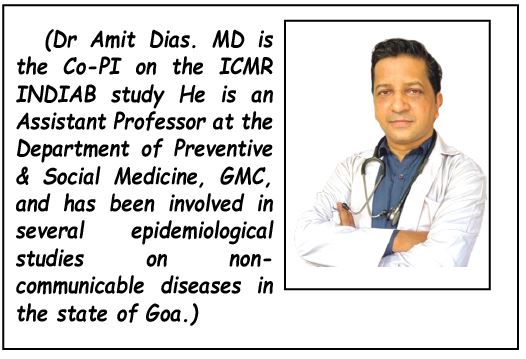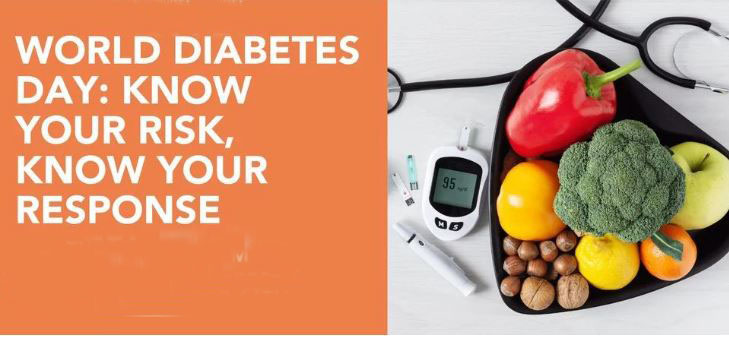November 14 is observed as World Diabetes Day in honor of Dr Frederick Banting who was born on this day and later co-discovered insulin. Goan Observer spoke to D. Amit Dias, MD, from the Department of Preventive & Social Medicine at the GMC, who is also the co-principal investigator of the ICMR INDIAB study recently published in the Lancet endocrinology, “Everyone should know their risk and know their response… diabetes is not a mild disease,” he warns.
Goan Observer: What is the burden of diabetes?
Dr Amit Dias: It’s a huge problem and is rapidly growing in recent times. According to the WHO, 1 in 10 people have diabetes. The global estimate is around 537 million suffer this condition. Almost 1 in 2 adults with diabetes (44%) remain undiagnosed. More than 1.2 million children and adolescents in the world have been diagnosed with Type 1 diabetes. Over 90% of diabetics are Type 2 diabetics. We recently published the results of the ICMR INDIAB study which was led by Dr Ankush Desai, professor in the Department of Endocrinology at Goa Medical College & Hospital.
Q: What was the key finding of the study?
A: The study revealed that Goa has the highest prevalence of diabetes in the country. According to our study, it was 26.4% above the age of 20 years. The study was conducted on a total of 113,043 individuals from all over India. (79,506 from rural areas and 33,537 from urban areas). The prevalence of diabetes and pre-diabetes for the whole country is 11.4% and 15.3% which is much lower than the findings in the state of Goa.
Q: That is indeed startling. Doctor, is there any priority focus for World Diabetes Day this year?
A: The theme for World Diabetes Day this year is “Know Your Risk, Know Your Response” – the focus is on risk reduction and prevention of diabetes. We can reverse diabetes or postpone the onset, but for that we need to know our risk factors and work towards minimizing them.

Q: Let’s understand from the very basics. Can you explain in simple language — what is diabetes?
A: Diabetes is a disease that occurs when your blood sugar levels start rising. The pancreas is an organ of our system that produces the hormone insulin which is essential for regulating the sugar levels in our blood. When we do not produce insulin or the body develops insulin resistance, the sugar levels will rise and lead to diabetes.
Q: What about the different types of diabetes?
A. There are various types of diabetes, such as Type 1 diabetes, where the body makes little or no insulin. This usually occurs in children and younger people and they have to take insulin for the rest of their life. Type 2 diabetes is what the majority of people suffer from, wherein there is insulin resistance and the fatty liver and muscle cells do not respond to insulin adequately. This is usually associated with obesity. Gestational diabetes refers to the diabetes associated with pregnancy. We also know of a condition called Maturity Onset Diabetes of the Young (MODY). This occurs in younger children and adolescents, but this is not similar to the Type 1 diabetes referred to earlier but is like the Type 2 diabetes which is usually seen in older people.
Q: Good to know. Since Type 2 does not depend on insulin, can we say it’s the milder form of diabetes?
A: No that is not true. People are often under the misconception that Type 2 diabetes is mild and nothing to worry about. One needs to take care with Type 2 diabetes and keep sugar levels under control to avoid complications.
Q: Can you name some complications in diabetes?
A: Diabetes can lead to several life-threatening complications such as heart disease, stroke, kidney failure, amputations, etc. It can also cause nerve injury (neuropathy), eye (retinopathy), and foot problems to name a few.
Q: As you said, the theme is “Know your risks.” Can you elaborate on the risks that predispose a person to get diabetes?
A: You are at higher risk of developing diabetes if you have the following:
• A family history of diabetes,
• A history of gestational diabetes (during pregnancy)
• Above-normal blood cholesterol levels
• Impaired glucose tolerance of fasting glucose level
• High blood pressure
• Age above 45 years
• Live a sedentary lifestyle
• Have a Body Mass Index of more than or equal to 23 kg/m2 (Overweight or Obese)
However having said that it does not mean that if you are not fat, you will not get diabetes — 20% of diabetics are not obese.
Q: What is your message for our readers on world diabetes day?
A. Diabetes is a wake-up call to tell you that your diet, exercise, and lifestyle are not healthy and need to be changed. It should not be looked upon as a limitation, instead, it is a motivator to adopt a healthy lifestyle. We need to screen and detect it early and adopt measures to reverse diabetes. We now have a lot more effective medications to treat diabetes and keep it under control. The management of diabetes is not on medication alone — it includes diet, exercise compliance with medication, and constant monitoring. Stay healthy, stay fit.

